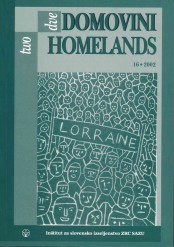Bert Pribac’s Spiritual Development as Reflected in his Poetry
Abstract
“Since greatness in literature is beyond my reach I devote myself to writing the truth about myself and the world around me, the truth, such as seen through my eyes. I can only give what I have. I had neither time nor fervor to aspire to something more.” These are the modest words of Bert Pribac on his literary efforts, quoted from “Zakaj pišem pesmi” (Why I Write Poetry; Svobodni razgovori, X/3, 1993, 8). As Pribac points out, his poetry reflects his perceptions, sensations and viewpoints on issues and people. Therefore, his poetry enlightens us as to his spiritual growth from his youth to the old age.
Youthful playfulness is cut short by the enforced decision to follow the path of wanderers, beggars and perpetual pilgrims of the world. Consequently, the beginnings of his life as an emigrant are characterised by pain and despair, caused by the realisation that he lost his home, friends and the most intimate moments of his life.
After his desperate hope for suitable life under the Southern Cross dies, the poet is driven to console himself with dreams. Dreams alone can conjure up the homey atmosphere of his beloved Istra. However, the Istra of his youth acquires the strongly idealised features, reflecting his wishes and hopes. It was a long time before Pribac abandoned his dreams of the lost paradise, forgot his grief and accepted the fact that Istra shows no greater kindness to her children than Australia shows to hers. To be brought face to face with the cruel and inexorable reality that denied him the opportunity to live in harmony with the spirit and the truth was a harsh blow for the poet.
But as he was suffocating in the dark abyss of loneliness and hopelessness, he discovered a path his instincts told him would lead to salvation. He realized his aspirations weren't directed to Istra or any other place in the world. Emigration wasn't what brought him far from home. Displacement was a direct result of his human nature, tainted by sin. This is one of the main themes od his second Australian period. Consequently, he'll be a stranger everywhere in this world, as his kingdom wasn't on Earth. Pribac discovered God: God is the one, who can give him shelter, as God is and will remain his home.
But God cannot be reached directly, but rather only through love for everything in his creation and the absolute devotion of soulmates in the vortex of religious eroticism. In his paradise rediscovered, Pribac found a soulmate with whom he could share the holiest experience of our being.
Downloads
References
Bori 1, n°2, 1955.
Chevalier J., G heerbrant A., Slovar simbolov. Ljubljana: M ladinska knjiga, 1995. Translated from the original Dictionnaire des Symboles by Stane Ivanc.)
Detela, L., »Berta Pribca poetična kozmologija«. Buenos Aires: Glas SKA, X X I/11-12, 1974.
Detela, L., »Slovenska bodočnost in problem narodne sprave v luči zdomskih političnoduhovnih izkušenj«. Buenos Aires: Meddobje, XXII/3-4, 1986.
Eliot, T.S., Selected poems. London: Faber and Faber, 1954, 1961, 1962, 1963, 1964, 1965, 1966, 1967, 1969, 1970, 1971, 1972, 1973.
Jurak, M. (ed.), Australian Papers. Ljubljana: Filozofska fakulteta, 1983.
Jurak, M., »Motivika v poeziji slovenskih izseljencev«. Ljubljana: Slovenski koledar, 36, 1989.
Jurak, M., »Poetry Written by Slovene Immigrants in Australia: Types of Imagery from the Old and the New Country«. Ljubljana: Filozofska fakulteta: M. Jurak (ed.), Australian Papers, 1983.
Jurak, M., »Slovene poetry in Australia: from terra incognita to terra felix«. Acta neophilologica, 29, 1996.
Jurak, M., »Slovenski pesniki v Avstraliji - razpeti med staro in novo domovino«. Književna smotra, 21, 1988.
Jurak, M., Maver, I. (ed.), Essays on Australian and Canadian Literature/E seji o avstralski in kanadski književnosti. Ljubljana: Znanstveni inštitut Filozofske fakultete, 2000.
Maver, I., »Literarno ustvarjanje avstralskih Slovencev v angleškem jeziku«. Ljubljana: ZRC SAZU: Rokus: Žitnik, J., Glušič, H. (ur.), Slovenska izseljenska književnost J - Evropa, Avstralija, Azija, 1999.
Maver, I., »The M editerranean in Mind: B. Pribac, a Slovene Poet in Australia«. Nedlands: The University of Western Australia: Westerly, 39/4, 1994.
Mlada pota, 11/6, 1956-57.
Mladina XIV, n°20, 1956.
Naša misel, n°8, 1952.
Prešeren, J., »Bert Pribac (Avstralija) - pot do poklicnega zadovoljstva in uspeha«. Ljubljana: M uzej novejše zgodovine Slovenije: Kokalj Kočevar, M. et al., IZSELJENEC - Življenjske zgodbe Slovencev po svetu zbornik ob razstavi, 2001.
Pribac, B., »Zakaj pišem pesmi«. Sydney: Svobodni razgovori, X/3, 1993.
Pribac, B., Bronasti tolkač. Melbourne: The Slovene Association, 1962.
Pribac, B., Bronasti tolkač in druge pesmi. Koper: Edicija Capris, 2000.
Pribac, B., Prozorni ljudje. Ljubljana: M ladinska knjiga, 1991.
Pribac, B., The Beautiful Vida and Other Poems from Two Homelands. Canberra: The Lapwing Private Press, 1987.
Pribac, B., V kljunu golobice. Canberra: Lapwing Private Press, 1973.
Suša, B., »Bronasti tolkač in V kljunu golobice«. Ljubljana: Dve domovini/ Two Homelands, 1, 1990.
Suša, B., »Literarno ustvarjanje Slovencev v Avstraliji v slovenskem jeziku«. Ljubljana: ZRC SAZU: Rokus: Žitnik, J., Glušič, H. (ur.), Slovenska izseljenska književnost 1 - Evropa, Avstralija, Azija, 1999.
Suša, B., »Pogledi na slovensko književnost«. Ljubljana: Dve domovini / Two Homelands, 4, 1993.
Suša, B., »Tisk slovenskih književnikov v Avstraliji«. Slovene Literary Works in the Australian Press) (Sydney: Svobodni razgovori, X /1-2, 1992.
Trebše, M., Klemenčič, M. (ur.), Slovensko izseljenstvo - Zbornik ob 50-letnici Slovenske izseljenske matice. Ljubljana: Združenje Slovenska izseljenska matica, 2001.
Zbornik avstralskih Slovencev /A nthology o f Australian Slovenes. Ljubljana: Slovenska izseljenska matica, SALUK/SALAC, 1985, 1988.
Žitnik, J., Glušič, H. (ur.), Slovenska izseljenska književnost 1 - Evropa, Avstralija, Azija. Ljubljana: ZRC SAZU: Rokus, 1999.
Downloads
Published
How to Cite
Issue
Section
License

This work is licensed under a Creative Commons Attribution-NonCommercial-NoDerivatives 4.0 International License.
Authors guarantee that the work is their own original creation and does not infringe any statutory or common-law copyright or any proprietary right of any third party. In case of claims by third parties, authors commit their self to defend the interests of the publisher, and shall cover any potential costs.
More in: Submission chapter





